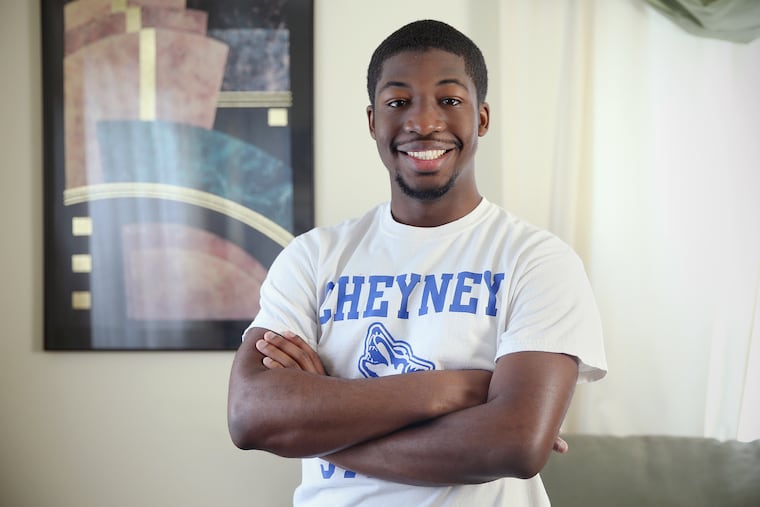$4M in money from Pa. to make college free for more Cheyney students
“Cheyney offered me a full ride,” said Justin McGriff, a motivated 18-year-old. “Leaving school without debt is important to me.”

With his high grade-point average and impressive resumé, Justin McGriff had his pick of colleges. In fact, he was admitted to 27 of them.
McGriff chose Cheyney University. The Ambler resident, a graduate of 21st Century Cyber Charter School, will enter the nation’s oldest historically black college as a computer-science major in the fall, and he said the decision was a simple one.
“Cheyney offered me a full ride,” said McGriff, a motivated 18-year-old with a penchant for coding. “Leaving school without debt is important to me.”
The Pennsylvania state budget that took effect July 1 will make it easier for students such as McGriff to follow a similar path to Cheyney: The spending plan contains $3.98 million to support the Keystone Honors Academy, which provides full scholarships to academically gifted students.
Jeffrey Jones, executive director of enrollment management at the university, said the allocation means much to Cheyney, which has struggled in recent years with enrollment, academics, and finances.
“This will help with retention, and allows us to go after high-quality students,” said Jones. “It’s an exceptional gift for this institution — for any institution."
The typical Keystone recipient has an SAT score of 1110, an ACT score of 23, and a high school GPA of 3.58, Jones said. Some students have SAT scores as high as 1400, with 4.0 GPAs.
Cheyney will soon begin notifying students who had been on a waiting list that they are now eligible to receive Keystones if they enroll at the Chester County university.
“We’ll see if we can’t get some of those students to enroll at Cheyney in the fall,” said Jones.
Aaron A. Walton, the university’s president, has said that he anticipates the university meeting its target of enrolling 275 freshmen for the fall, bringing its overall student population to 634.
The school’s enrollment fell below 500 last year.
Walton has also said that he believes the university will meet its goal of a balanced budget for the just-ended fiscal year.
The Middle States Commission on Higher Education will decide in the fall whether to renew Cheyney’s accreditation; it has been granted extensions by Middle States in the last two years. The school’s rocky financial picture has called renewal into question.
Cheyney belongs to the Pennsylvania State System of Higher Education, whose chancellor, Daniel Greenstein, had suggested the university affiliate with another or provide career training programs that could operate without accreditation. But a February meeting with Gov. Tom Wolf yielded an agreement to allow Cheyney to continue its reform efforts.
“The scholarship funding comes at a great time, with the university enjoying a resurgence in academics, culture and support,” Walton said in a release.
The Keystone Honors Academy is one of a kind: the only such full-scholarship program offered by the state system. It offers participants the ability to study abroad and conduct research.
Last year, the state allotted Cheyney $2.3 million for the Keystone Honors Academy; the new sum represents a 73 percent increase in funding.
For McGriff, the scholarship speaks louder than any outside concerns about the university.
When he was 14, he announced to his parents that he had done research about college costs and student loans, and he was going to attend the school that gave him the best financial-aid package.
“To come out of college with zero debt today, that’s a whole life-changing event,” said Jerome McGriff, Justin’s father, a federal worker. His mother, Hazel, a school secretary, said it was a relief for the family, which is paying private-school tuition for McGriff’s younger brother.
Justin McGriff said he liked the idea of attending a historically black college, and felt comfortable at the school, the alma mater of a few family members and friends.
“But mostly, my mind-set was: If I can get my degree and go on to the workforce without paying a loan, that would be really good,” said McGriff. “I think a lot about financials.”